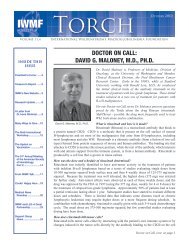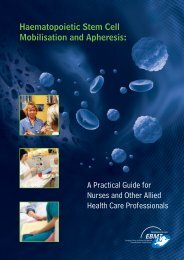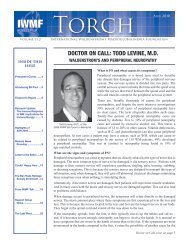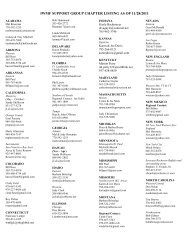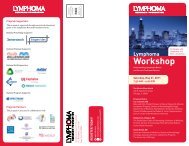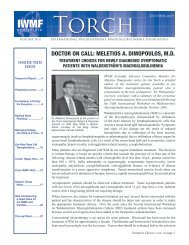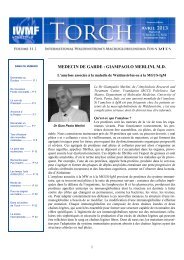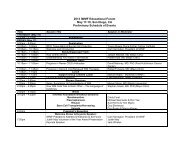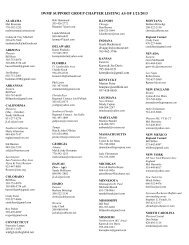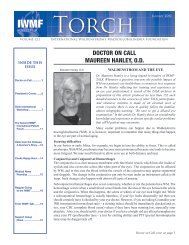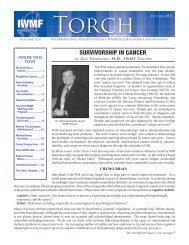Fall 2007 - International Waldenstrom's Macroglobulinemia ...
Fall 2007 - International Waldenstrom's Macroglobulinemia ...
Fall 2007 - International Waldenstrom's Macroglobulinemia ...
Create successful ePaper yourself
Turn your PDF publications into a flip-book with our unique Google optimized e-Paper software.
TREASURER’S REPORT<br />
AS OF JUNE 30, <strong>2007</strong><br />
James Bunton, Treasurer<br />
The finances of IWMF are operated through two separate<br />
funds: the Research Fund and the Operating Fund.<br />
Research Clinical Highlights, cont from page 7<br />
<strong>International</strong> Workshop on WM (Athens, 2002) recognized<br />
that the sole parameter distinguishing SWM from IgM-MGUS<br />
is the presence, established by microscopic examination, of<br />
lymphoplasmacytic non-Hodgkin’s lymphoma cells in the<br />
bone marrow.<br />
PAGE 8<br />
The Research Fund accounts for all contributions received<br />
for research and is charged only for funds to be expended on<br />
approved research projects.<br />
The Operating Fund accounts for contributions from<br />
members that are not designated as being for research, such<br />
as membership contributions. This fund is charged with all<br />
member services expenses and all operating expenses (none<br />
of which are charged to the Research Fund).<br />
Following is a summary of the financial results for its first<br />
six months of <strong>2007</strong>:<br />
Research Operating Total<br />
Income $323,000 $128,000 $451,000<br />
Expenses 275,000 275,000<br />
Net Income or<br />
(loss) $323,000 ($147,000) $176,000<br />
Income in the Research Fund was very encouraging in<br />
the first half of the year as a result of some significant<br />
contributions, especially from our pledge contributors. No<br />
research projects were approved in the first half of the year.<br />
As a result the fund had no expenses and the net income<br />
in the Research Fund was equal to the gross income for<br />
the period. The research award approved in August to Dr.<br />
Braggio at Mayo, mentioned elsewhere in this issue, will be<br />
an expense of the last half of the year.<br />
Unfortunately, the results in the Operating Fund are quite<br />
different. Expenses for the first six months were very high,<br />
increasing $100,000 over the same period last year. The<br />
major increases in cost this year were the Educational Forum,<br />
fundraising, and especially the printing costs and related<br />
postage of three new major booklets for WM members. While<br />
the resulting net loss of $147,000 is cause for concern, we<br />
should keep in mind that our annual membership campaign<br />
is held in the last few months of year. That is when a large<br />
share of our members’ contributions to the Operating Fund<br />
are received.<br />
In the next few weeks you will be receiving a letter asking<br />
you to make a membership donation. Please consider our<br />
current net loss situation and try to increase your donation<br />
to a higher level than in the past. IWMF needs a healthy<br />
Operating Fund to continue its current member services and<br />
add new ones to assist our members.<br />
Dr. Morra’s more recent study evaluated the prognosis for<br />
patients with IgM-MGUS versus patients with SWM. She<br />
noted that IgM-MGUS patients have a slight overall survival<br />
advantage compared to SWM patients but noted as well<br />
that SWM patients have a mortality rate equivalent with<br />
that of the general population. Risk factors for evolution<br />
of IgM-MGUS into WM or evolution of SWM into active<br />
WM were generally comparable. Increasing levels of IgM,<br />
detection of protein in the urine, decreased levels of IgG<br />
and/or IgA, anemia and other red blood cell abnormalities,<br />
elevated ß2-microglobulin, and other irregularities could<br />
predict evolution into more aggressive disease. Dr. Morra<br />
concluded that IgM-MGUS may be considered as the first<br />
step of an indolent lymphoproliferative disease and as such<br />
recommended periodic bone marrow biopsy evaluations as<br />
well as the requisite blood tests.<br />
Dr. Pierre Morel of France expanded on the role of prognostic<br />
factors in WM. He reported on an <strong>International</strong> Prognostic<br />
Scoring System for Waldenstrom’s <strong>Macroglobulinemia</strong><br />
developed by a number of cooperative groups and institutions.<br />
Review of patient records, essentially retrospective analyses,<br />
identified several risk factors that were consistently associated<br />
with a poor clinical outcome. The combination of advanced<br />
age, IgM levels, low hemoglobin concentration, low platelet<br />
count, low serum albumin concentration and an elevated<br />
serum ß2-microglobulin provides a simple prognostic model<br />
for survival in WM.<br />
Part 2 of this article will be presented in the winter edition<br />
of the Torch.<br />
have your say<br />
The Torch welcomes letters, articles or<br />
suggestions for articles.<br />
If you have something you'd like to share with<br />
your fellow WMers, please contact<br />
Don Lindemann at 510-848-4069 or<br />
torcheditor@gmail.com



